英语句子名词化改写
- 格式:doc
- 大小:13.00 KB
- 文档页数:1
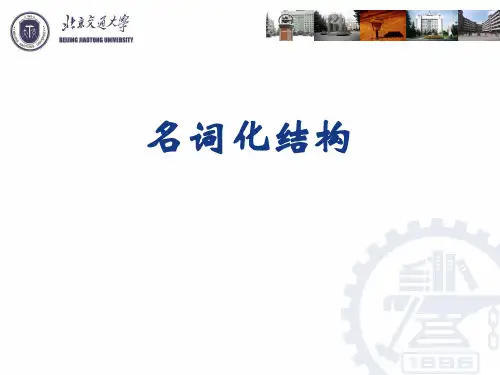
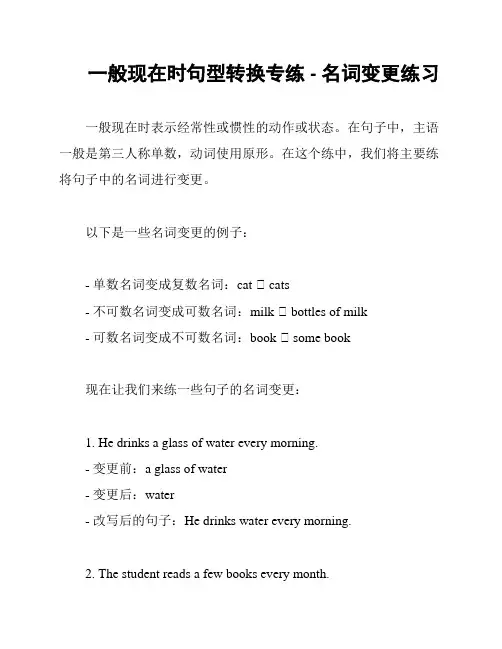
一般现在时句型转换专练 - 名词变更练习一般现在时表示经常性或惯性的动作或状态。
在句子中,主语一般是第三人称单数,动词使用原形。
在这个练中,我们将主要练将句子中的名词进行变更。
以下是一些名词变更的例子:- 单数名词变成复数名词:cat ➡️ cats- 不可数名词变成可数名词:milk ➡️ bottles of milk- 可数名词变成不可数名词:book ➡️ some book现在让我们来练一些句子的名词变更:1. He drinks a glass of water every morning.- 变更前:a glass of water- 变更后:water- 改写后的句子:He drinks water every morning.2. The student reads a few books every month.- 变更前:books- 变更后:book- 改写后的句子:The student reads a book every month.3. My family has two cars.- 变更前:cars- 变更后:car- 改写后的句子:My family has two cars.4. She always eats fruits for breakfast.- 变更前:fruits- 变更后:fruit- 改写后的句子:She always eats fruit for breakfast.- 变更前:software- 变更后:some software练习这些句子不仅能帮助你练习一般现在时的用法,也能够帮助你更好地理解名词的用法及其变化。
祝你练习愉快!。
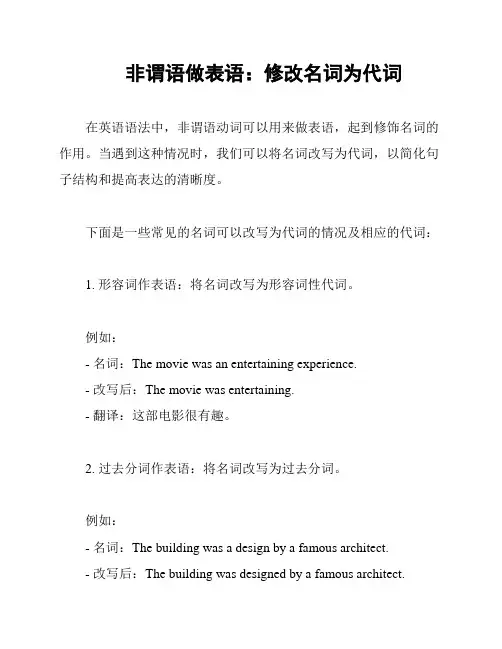
非谓语做表语:修改名词为代词在英语语法中,非谓语动词可以用来做表语,起到修饰名词的作用。
当遇到这种情况时,我们可以将名词改写为代词,以简化句子结构和提高表达的清晰度。
下面是一些常见的名词可以改写为代词的情况及相应的代词:1. 形容词作表语:将名词改写为形容词性代词。
例如:- 名词:The movie was an entertaining experience.- 改写后:The movie was entertaining.- 翻译:这部电影很有趣。
2. 过去分词作表语:将名词改写为过去分词。
例如:- 名词:The building was a design by a famous architect.- 改写后:The building was designed by a famous architect.- 翻译:这座建筑是由一位著名的建筑师设计的。
3. 现在分词作表语:将名词改写为现在分词。
例如:- 名词:The job is an exciting opportunity.- 改写后:The job is an exciting opportunity.- 翻译:这份工作是一个令人兴奋的机会。
4. 不定式作表语:将名词改写为不定式。
例如:- 名词:The goal is to finish the project on time.- 改写后:The goal is to finish the project on time.- 翻译:目标是按时完成项目。
通过将名词改写为代词,我们可以简化句子结构并提高句子的流畅性和清晰度。
请注意,在改写时要确保代词的形式和原名词在语法上是一致的。
希望这份文档能帮助你理解和应用非谓语做表语时将名词改写为代词的方法。
如有任何问题,请随时向我提问。
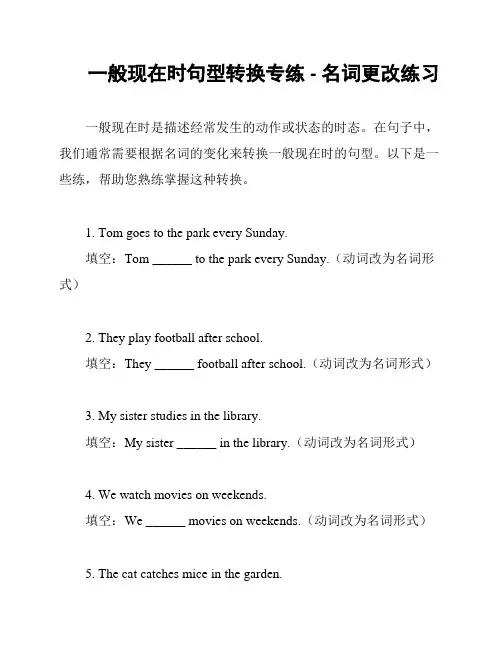
一般现在时句型转换专练 - 名词更改练习一般现在时是描述经常发生的动作或状态的时态。
在句子中,我们通常需要根据名词的变化来转换一般现在时的句型。
以下是一些练,帮助您熟练掌握这种转换。
1. Tom goes to the park every Sunday.填空:Tom ______ to the park every Sunday.(动词改为名词形式)2. They play football after school.填空:They ______ football after school.(动词改为名词形式)3. My sister studies in the library.填空:My sister ______ in the library.(动词改为名词形式)4. We watch movies on weekends.填空:We ______ movies on weekends.(动词改为名词形式)5. The cat catches mice in the garden.填空:The cat ______ mice in the garden.(动词改为名词形式)6. John and Mary go shopping on Saturdays.填空:John and Mary ______ shopping on Saturdays.(动词改为名词形式)7. The students study English in the classroom.填空:The students ______ English in the classroom.(动词改为名词形式)8. She eats breakfast at home.填空:She ______ breakfast at home.(动词改为名词形式)9. He teaches math in the school.填空:He ______ math in the school.(动词改为名词形式)10. I play the piano in the evening.填空:I ______ the piano in the evening.(动词改为名词形式)请根据上述句子的要求,填写相应的名词形式并核对答案。

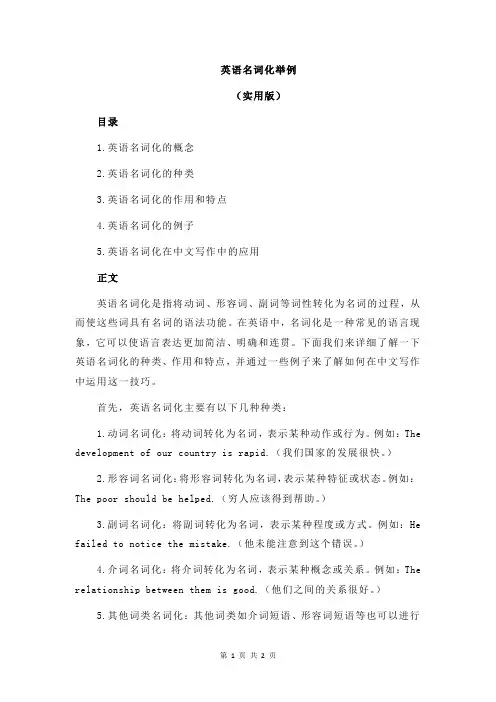
英语名词化举例(实用版)目录1.英语名词化的概念2.英语名词化的种类3.英语名词化的作用和特点4.英语名词化的例子5.英语名词化在中文写作中的应用正文英语名词化是指将动词、形容词、副词等词性转化为名词的过程,从而使这些词具有名词的语法功能。
在英语中,名词化是一种常见的语言现象,它可以使语言表达更加简洁、明确和连贯。
下面我们来详细了解一下英语名词化的种类、作用和特点,并通过一些例子来了解如何在中文写作中运用这一技巧。
首先,英语名词化主要有以下几种种类:1.动词名词化:将动词转化为名词,表示某种动作或行为。
例如:The development of our country is rapid.(我们国家的发展很快。
)2.形容词名词化:将形容词转化为名词,表示某种特征或状态。
例如:The poor should be helped.(穷人应该得到帮助。
)3.副词名词化:将副词转化为名词,表示某种程度或方式。
例如:He failed to notice the mistake.(他未能注意到这个错误。
)4.介词名词化:将介词转化为名词,表示某种概念或关系。
例如:The relationship between them is good.(他们之间的关系很好。
)5.其他词类名词化:其他词类如介词短语、形容词短语等也可以进行名词化。
例如:The students" progress is obvious.(学生们的进步是明显的。
)英语名词化具有以下作用和特点:1.作用:名词化可以使语言表达更加简洁、明确和连贯,避免重复和冗余。
2.特点:名词化通常会失去原词性的某些语法特征,如时态、语态、数等,并具有名词的语法功能。
接下来,我们来看一些英语名词化的例子:1.The rich are getting richer, while the poor are getting poorer.(富人越来越富,穷人越来越穷。
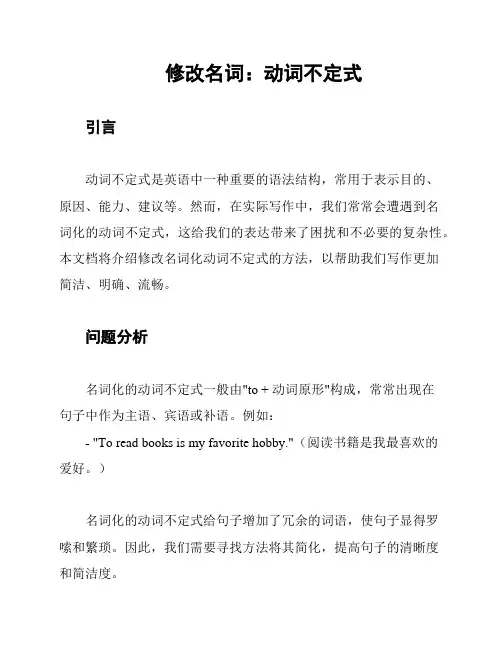
修改名词:动词不定式引言动词不定式是英语中一种重要的语法结构,常用于表示目的、原因、能力、建议等。
然而,在实际写作中,我们常常会遭遇到名词化的动词不定式,这给我们的表达带来了困扰和不必要的复杂性。
本文档将介绍修改名词化动词不定式的方法,以帮助我们写作更加简洁、明确、流畅。
问题分析名词化的动词不定式一般由"to + 动词原形"构成,常常出现在句子中作为主语、宾语或补语。
例如:- "To read books is my favorite hobby."(阅读书籍是我最喜欢的爱好。
)名词化的动词不定式给句子增加了冗余的词语,使句子显得罗嗦和繁琐。
因此,我们需要寻找方法将其简化,提高句子的清晰度和简洁度。
修改方法以下是一些常见的修改方法,以便我们优化名词化的动词不定式:方法一:使用动词原形将名词化的动词不定式替换为动词原形,以简化句子结构。
例如:- "To find a solution to the problem"(寻找解决问题的方法)可简化为 "Finding a solution to the problem"(寻找问题解决方法)。
方法二:使用名词将动词不定式替换为相应的名词,以使句子更加简洁。
例如:- "To make a decision"(做决定)可简化为 "Decision making"(决策)。
方法三:使用动词短语或动词从句将名词化的动词不定式替换为相应的动词短语或动词从句,以提高句子的灵活性和流畅性。
例如:- "To solve this problem, we need to work together."(为了解决这个问题,我们需要共同努力。
)可简化为 "By working together, we can solve this problem."(通过共同努力,我们能够解决这个问题。
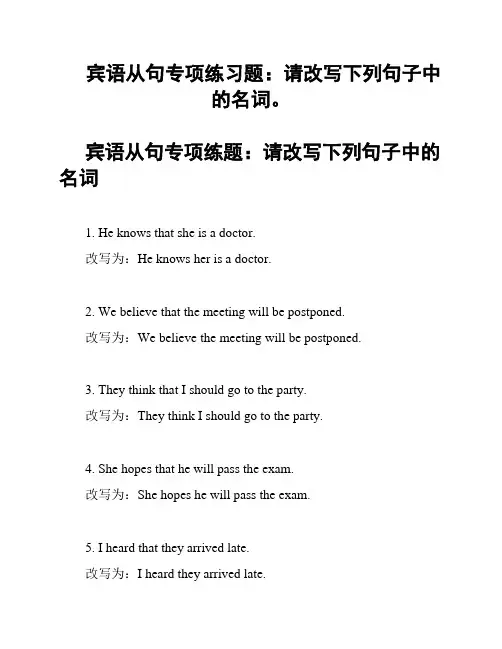
宾语从句专项练习题:请改写下列句子中的名词。
宾语从句专项练题:请改写下列句子中的名词1. He knows that she is a doctor.改写为:He knows her is a doctor.2. We believe that the meeting will be postponed.改写为:We believe the meeting will be postponed.3. They think that I should go to the party.改写为:They think I should go to the party.4. She hopes that he will pass the exam.改写为:She hopes he will pass the exam.5. I heard that they arrived late.改写为:I heard they arrived late.6. He doesn't realize that he is making a mistake.改写为:He doesn't realize he is making a mistake.8. We expect that it will rain tomorrow.改写为:We expect it will rain tomorrow.9. She believes that honesty is important.改写为:She believes honesty is important.10. He explained that he couldn't attend the meeting.改写为:He explained he couldn't attend the meeting.11. They predict that the economy will improve next year. 改写为:They predict the economy will improve next year.12. I feel that I need a vacation.改写为:I feel I need a vacation.13. She understands that he is busy.改写为:She understands he is busy.14. We know that they are in Paris.改写为:We know they are in Paris.15. He mentioned that he was feeling tired.改写为:He mentioned he was feeling tired.16. They hope that they can finish the project on time.改写为:They hope they can finish the project on time.17. I believe that he is telling the truth.改写为:I believe he is telling the truth.18. She thinks that studying abroad is a great opportunity. 改写为:She thinks studying abroad is a great opportunity.19. We heard that the concert was canceled.改写为:We heard the concert was canceled.20. He knows that she loves him.改写为:He knows she loves him.以上是宾语从句专项练习题中的名词改写,请查阅。
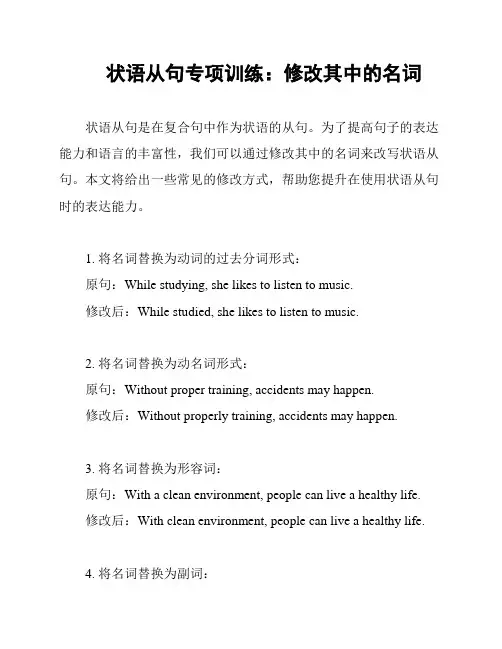
状语从句专项训练:修改其中的名词状语从句是在复合句中作为状语的从句。
为了提高句子的表达能力和语言的丰富性,我们可以通过修改其中的名词来改写状语从句。
本文将给出一些常见的修改方式,帮助您提升在使用状语从句时的表达能力。
1. 将名词替换为动词的过去分词形式:原句:While studying, she likes to listen to music.修改后:While studied, she likes to listen to music.2. 将名词替换为动名词形式:原句:Without proper training, accidents may happen.修改后:Without properly training, accidents may happen.3. 将名词替换为形容词:原句:With a clean environment, people can live a healthy life.修改后:With clean environment, people can live a healthy life.4. 将名词替换为副词:原句:With great effort, he achieved his goal.修改后:With greatly effort, he achieved his goal.5. 将名词替换为代词:原句:After finishing her homework, Mary went to bed.修改后:After finishing it, Mary went to bed.通过以上的修改方式,我们可以简化句子结构,增强表达的多样性和灵活性。
在使用状语从句时,鼓励大家根据具体语境适当修改其中的名词,以提升文章的流畅度和表达能力。
请注意,根据具体语境,以上修改方式并非适用于所有情况。
在修改状语从句时,请根据具体语境和句子结构合理选择适当的修改方式。
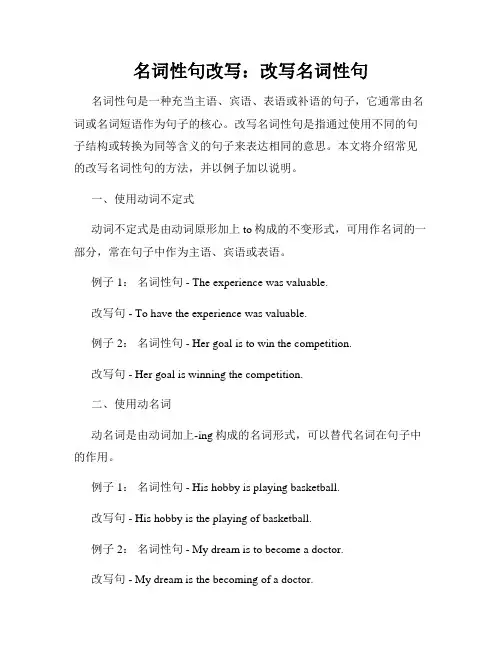
名词性句改写:改写名词性句名词性句是一种充当主语、宾语、表语或补语的句子,它通常由名词或名词短语作为句子的核心。
改写名词性句是指通过使用不同的句子结构或转换为同等含义的句子来表达相同的意思。
本文将介绍常见的改写名词性句的方法,并以例子加以说明。
一、使用动词不定式动词不定式是由动词原形加上to构成的不变形式,可用作名词的一部分,常在句子中作为主语、宾语或表语。
例子1:名词性句 - The experience was valuable.改写句 - To have the experience was valuable.例子2:名词性句 - Her goal is to win the competition.改写句 - Her goal is winning the competition.二、使用动名词动名词是由动词加上-ing构成的名词形式,可以替代名词在句子中的作用。
例子1:名词性句 - His hobby is playing basketball.改写句 - His hobby is the playing of basketball.例子2:名词性句 - My dream is to become a doctor.改写句 - My dream is the becoming of a doctor.三、使用名词从句名词从句是一个引导词加上从句构成的句子,可以在句子中作为名词的一部分。
例子1:名词性句 - The fact is true.改写句 - What is true is the fact.例子2:名词性句 - Her belief is that honesty is the best policy.改写句 - Her belief is the belief that honesty is the best policy.四、使用形容词性从句形容词性从句是一个引导词加上从句构成的句子,可以在句子中作为名词的一部分。
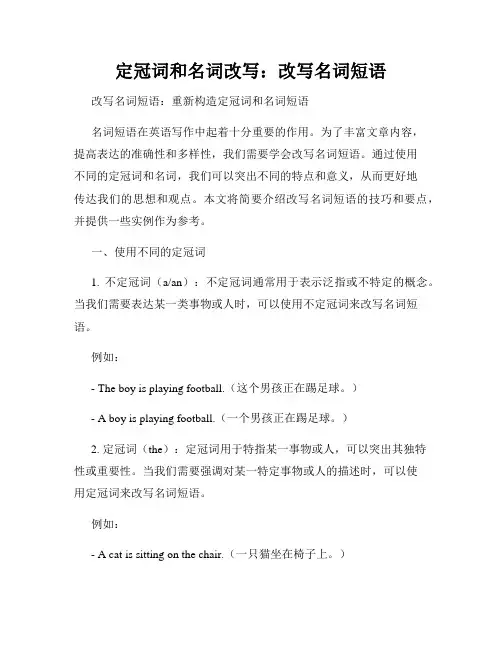
定冠词和名词改写:改写名词短语改写名词短语:重新构造定冠词和名词短语名词短语在英语写作中起着十分重要的作用。
为了丰富文章内容,提高表达的准确性和多样性,我们需要学会改写名词短语。
通过使用不同的定冠词和名词,我们可以突出不同的特点和意义,从而更好地传达我们的思想和观点。
本文将简要介绍改写名词短语的技巧和要点,并提供一些实例作为参考。
一、使用不同的定冠词1. 不定冠词(a/an):不定冠词通常用于表示泛指或不特定的概念。
当我们需要表达某一类事物或人时,可以使用不定冠词来改写名词短语。
例如:- The boy is playing football.(这个男孩正在踢足球。
)- A boy is playing football.(一个男孩正在踢足球。
)2. 定冠词(the):定冠词用于特指某一事物或人,可以突出其独特性或重要性。
当我们需要强调对某一特定事物或人的描述时,可以使用定冠词来改写名词短语。
例如:- A cat is sitting on the chair.(一只猫坐在椅子上。
)- The cat is sitting on the chair.(那只猫坐在椅子上。
)二、使用不同的名词1. 单数名词改写为复数名词:将单数名词改写为复数名词可以表示数量、种类或范围的增加,从而丰富表达。
例如:- The book is on the table.(这本书在桌子上。
)- The books are on the table.(这些书在桌子上。
)2. 普通名词改写为专有名词:将普通名词改写为专有名词可以强调特定事物或人的唯一性或特殊性。
例如:- The teacher is very nice.(这位老师很友好。
)- Miss Smith is very nice.(史密斯小姐很友好。
)3. 具体名词改写为抽象名词:将具体名词改写为抽象名词可以突出描述事物的属性、特征或状态。
例如:- The tree has beautiful flowers.(这棵树开着美丽的花。
专题14 句子提升思维之名词化一、读后续写中抽象名词的运用文本赏析:At that, Miss Walker smiled and asked the class to listen to Jenny’s speech first. Jenny made her way to the platform with every confidence. Words began to flood out of her. “How could she make it? We’ve never seen Jenny give so terrific a speech.” Whispers went around the classroom, and even Miss Walker nodded with approval. Immediately Jenny finished her speech, a storm of applause erupted from the class.Relieved, Jenny told everyone the truth, and especially the magic of the watch. “But it’s just an ordinary watch with no magic”, Lee announced. [80 words]文中多次运用到抽象名词作主语:Words began to flood out of her.Whispers went around the classroom, and even...Immediately Jenny finished her speech, a storm of applause erupted from the class.二、概要写作中抽象名词的使用(一)despite的使用1. Though Mike was reminded many times, apparently he didn't return the money.➢Many times though Mike was reminded, apparently he didn‘t return the money.(变倒装句)•拔高:概写中although/though 换成despite•第一种方法把动词变成doing。
As a high school student, Ive always been fascinated by the power of language and the way it can transform our thoughts and experiences into a narrative. One of the most intriguing aspects of English is its flexibility, allowing us to turn sentences into nouns, which can be a powerful tool for expression. This essay will delve into my personal journey of understanding and utilizing this linguistic feature.Growing up, I was always an avid reader, immersing myself in the works of authors who could weave sentences into intricate tales. It was during one of these reading sessions that I first encountered the concept of turning a sentence into a noun. I remember reading a line that encapsulated an entire story within a single phrase, and I was captivated by the idea that a sentence could carry such weight.My curiosity piqued, I began to explore this concept further in my own writing. I started by taking simple sentences and experimenting with how they could be restructured into nouns. For instance, the sentence She danced gracefully became Her dance was a moment of grace. This simple transformation allowed me to focus on the essence of the action, highlighting the beauty of the dance rather than just the act itself.As I honed this skill, I found that turning sentences into nouns could add depth and richness to my writing. It allowed me to create vivid images and evoke emotions more effectively. For example, instead of saying The sun set, casting a warm glow over the town, I could write The sunsets warm glow bathed the town in tranquility. This not only shortened the sentence but also intensified the visual and emotional impact.In my academic life, this technique proved to be particularly useful in essay writing. By turning complex ideas into concise noun phrases, I could convey my thoughts more clearly and effectively. This was especially helpful in argumentative essays, where clarity and precision are paramount. For instance, instead of writing The fact that pollution is increasing is alarming, I could write The alarming increase in pollution.Moreover, I discovered that this linguistic tool could also enhance my understanding of literature. By identifying and analyzing sentences turned into nouns in the texts I studied, I gained a deeper appreciation for the authors craft. It was like unlocking a secret layer of meaning that was hidden within the words.One of the most memorable instances of this was when I read To Kill a Mockingbird by Harper Lee. The novel is filled with powerful sentences turned into nouns, such as The mockingbirds innocent song symbolizing the purity of characters like Tom Robinson and Scout. Recognizing these transformed sentences helped me grasp the deeper themes of innocence and injustice in the story.In conclusion, my exploration of turning sentences into nouns has been a rewarding journey that has enriched both my writing and my reading. It has taught me the importance of brevity and impact in language, and has given me a new appreciation for the art of storytelling. As I continue to grow as a writer and a student, I will carry this knowledge with me, using it to create narratives that are both powerful and poignant.。
托福写作名词化句子有哪些托福写作名词化句子有哪些考生在备考托福考试的写作部分时,可以多了解一下名词化方面的句子。
以下是店铺为大家整理了托福考试写作的常用名词化句子,一起来看看吧!托福写作名词化句子1. 谓语动词的宾语部分原句:I do not know either what she meant or what he intends.名词化:I do not know either her meaning or his intentions.2. 结合被动形式原句:If people decide without enough persuasive information,...名词化:If a decision is made without enough persuasive information,...3. 取代诸如从句中“the fact that”的用法原句:The fact that I denied what he accused me of impressed the jury.名词化:My denial of his accusations impressed the jury.更好的名词化:a. When I denied his accusations, I impressed the jury.b. In denying his accusations, I impressed the jury.4. 名词化部分用在there is/are的后面原句:We demand that the government stop taxing entertainment.名词化:There is a demand for an end to taxation on entertainment.原句:The floods considerably eroded the land.名词化:There was considerable erosion of the land from thefloods.托福作文毫无意义的`名词化这些我们在托福写作中认为应当使用的名词化,其实是没必要的:1. 名词化部分跟在动词后面原句:The police conducted an investigation into the matter.改后:The police investigated the matter.2. 名词化部分作为主语原句:Our discussion is concerned with a tax cut.改后:We discussed a tax cut.3. 连续进行名词化原句:a. First, she reviewed the evolution of the dorsal fin.b. There was a first a review of the evolution of the dorsal fin.改后:First, she reviewed how the dorsal fin evolved.4. 连接部分名词化原句:Their cessation of hostilities was because of their personnel losses.改后:They ceased hostilities because they lost personnel.原句:The instability of the motor housing did not preclude the completion of the field trials.改后:Even though the motor housing was unstable,the research staff completed the field trials.托福写作练习材料:户外和室内休闲方式Some people prefer to spend their free time outdoors. Other people prefer to spend their leisure time indoors. Would you prefer to be outside or would you prefer to be inside for your leisure activities? Use specific reasons and examples to explain your choice.参考分析:根据个人的具体情况立意,并给出充分的理由。
句子改写:修改句子中的名词本文档将提供一些简单的策略和技巧,帮助您改写句子中的名词。
请注意,文档长度为800字以上。
1. 使用同义词替换名词有时候,句子中的某个名词不够具体或不够准确。
在改写句子时,您可以尝试使用同义词来替换原本的名词,以增强句子的表达力。
例如:原句:The dog chased the cat in the park.改写句:The canine chased the feline in the park.2. 描述名词的特征句子中的名词有时可以通过添加形容词或描述词来进行改写。
这样做可以使句子更具描述性和生动性。
例如:原句:I bought a car.改写句:I bought a red sports car.3. 使用动词或动名词替代名词短语某些名词短语可以被替换为动词或动名词短语,以使句子更加简洁明了。
例如:原句:The meeting was attended by all employees.改写句:All employees attended the meeting.4. 使用代词替代重复的名词如果句子中出现重复的名词,可以使用代词来避免冗余。
这有助于使句子更简洁和清晰。
例如:原句:John is a doctor. John works at a hospital.改写句:John is a doctor. He works at a hospital.5. 换用不同的句型有时候,通过改变句子的结构和句型,可以更好地表达原意。
例如:希望以上的简单策略和技巧能够帮助您在改写句子中的名词时更加灵活和创造性。
根据具体情况选择合适的方法,使句子更加流畅和精确。
修改名词后的10个例子:修改名词后的10个例子在英语中,我们经常使用名词来描述人、事物和概念。
然而,有时候我们需要根据上下文或语法需要来修改名词的形式。
在本文档中,我们将提供10个例子来展示如何修改名词的不同形式。
1. 单数名词变复数- 原始名词:dog(狗)- 修改后:dogs(狗们)- 例句:I saw three dogs playing in the park.2. 复数名词变单数- 原始名词:children(孩子们)- 修改后:child(孩子)- 例句:The child is playing in the garden.3. 名词变为形容词- 原始名词:music(音乐)- 修改后:musical(音乐的)- 例句:She is a talented musical artist.4. 去掉名词后缀- 原始名词:actress(女演员)- 修改后:actor(演员)- 例句:He is a famous actor in Hollywood.5. 名词变为动词- 原始名词:input(输入)- 修改后:to input(输入)- 例句:Please remember to input your password.6. 加上名词后缀- 原始名词:friend(朋友)- 修改后:friendship(友谊)- 例句:Their friendship has lasted for many years.7. 名词变为副词- 原始名词:quick(快速)- 修改后:quickly(快速地)- 例句:She ran quickly to catch the bus.8. 名词的所有格形式- 原始名词:child(孩子)- 修改后:child's(孩子的)- 例句:The child's toy is on the table.9. 名词变为比较级- 原始名词:tall(高)- 修改后:taller(更高)- 例句:She is taller than her sister.10. 名词变为最高级- 原始名词:good(好)- 修改后:best(最好)- 例句:He is the best player on the team.以上是修改名词后的10个例子,这些例子展示了如何使用不同的语法规则和调整词形来改变名词的形式。
名词改写与练习
名词改写是英语写作中的一项重要技能,通过改写名词可以丰
富表达方式,避免使用重复的词语。
下面是几种常见的名词改写方
法和练习。
1.同义词替换
使用同义词替换名词可以使文笔更加流畅,同时避免过多重复。
举例来说:
原句:The city is known for its beautiful architecture.
改写:___.
2.部分改写
有时候我们可以通过改变名词的结构或者添加形容词来进行部
分改写。
例如:
原句:___.
改写:___.
3.议论代替
当我们想要避免过多使用名词时,可以使用相关的论述代替。
例如:
原句:___.
改写:___.
练习
以下是一些练习,帮助你提升名词改写的能力。
尽量使用不同的方法改写每个名词。
1.Our company is known for ___.
2.The government should take n to protect the ___.
3.___.
4.___.
5.His speech left a deep ___ audience.
总结
名词改写是提高英语写作表达的有效方法之一。
通过使用同义词替换、部分改写以及议论代替等方法,我们可以使文笔更加流畅且丰富。
请多加练习,提升名词改写的技巧。